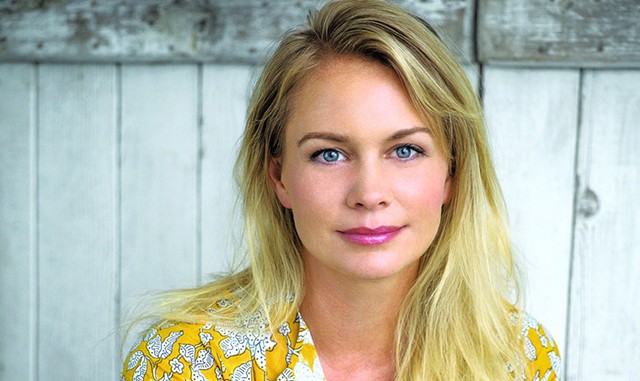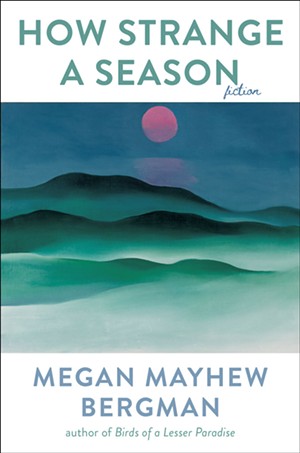
- Courtesy Of Nina Subin
- Megan Mayhew Bergman
Megan Mayhew Bergman is more than one kind of writer. Author of three collections of short fiction, including the new How Strange a Season, she has also been a regular columnist for the British newspaper the Guardian, reporting on the climate emergency and our country's fractious contemporary culture.
Mayhew Bergman was born in South Carolina and spent much of her first 30 years in North Carolina. As she told Seven Days by email, "I love complicating a global notion of the American South. Many people — New Englanders included — think of it as simply 'down there,' a monolithic block of conservative NASCAR fans. I believe the American South is worse than people think, and also much better — there is no 'one' south."
Mayhew Bergman moved to Vermont in 2009 when her partner, who grew up in Shaftsbury, returned to the state to join his family's veterinary practice. She currently teaches literature and environmental writing at Middlebury College, where her courses include "The Feminine Heroic," "Women in Conservation Writing," and "Class and Conservation in the American South." She is the director of the Bread Loaf Environmental Writers' Conference and has been a writer-in-residence at the Conservation Law Foundation, helping train lawyers and scientists to deliver what she called more "emotionally impactful" testimony and op-eds.
"One of my passions in life," she wrote to Seven Days, "is to explode a notion of what 'environmental writing' can be, and who can consider themselves an 'environmental writer.'"
Asked about her divergent routes as a writer, Mayhew Bergman described herself as "a huge fan of short fiction and the artistry of it — compression, line-level focus, a well-placed turn. I am also a huge nerd who wakes up in a panic about environmental degradation — I like being able to honor that side of myself in nonfiction," she continued. "The forms feed each other. Because I have nonfiction outlets, I can (largely) keep righteousness out of my short fiction."
Her new book of stories implies the climate emergency more than depicting it. In "A Taste for Lionfish," an unnamed narrator whose lover has departed tries to allay her grief by working as a canvasser for an environmental group. Her assignment is to persuade people in a North Carolina fishing community to eat an invasive species, which is venomous if touched but "plentiful and free, and they taste great." She's an abject failure at the job.
In the story "Inheritance," set at the other end of the country, a young woman moves to northern California to take possession of a home bequeathed to her by a grandmother who had come to despise the rest of the family. The house is a midcentury-modern "glass box" precariously sited on a precipice over the Pacific Ocean and shaken by ever-stronger storms.
The future was closing in, she thought. An enormous slide of earth and rock had surged over the road and into the ocean like a giant tongue.
All of the women in How Strange a Season appear to be stunned — not by war, hunger, eviction or addiction but by the anticipation of impending catastrophes that are still mostly out of sight, yet coming on fast.
And these women seem like casualties of their privileges. Class and racial advantages have freed them to have bizarre, contradictory jobs — or no jobs at all. Marianna is a florist who creates extravagantly sculptural displays (ephemeral, of course) for a tiny clientele. Farrah spends her days in elaborate exercise regimes. Regan, somewhat more enterprising, runs a retreat center in the Arizona desert, where wealthy businessmen pay to smash things with bulldozers and excavators.
Meanwhile, the men in these stories are "soon-to-be exes" or, at best, "gently estranged" from their partners; they're even more adrift than the women.
Are Mayhew Bergman's characters showing us the weird deviations of human sensibility in what may be the late evening of our Earthly dominion? Will extreme variations proliferate among us, as the stresses and antagonisms caused by a collapsing environment grow ever more obvious?

- Courtesy
- How Strange a Season by Megan Mayhew Bergman, Scribner, 304 pages. $26.99.
Many of Mayhew Bergman's stories are set in the American South. Asked about her persisting relationship to that region, she replied, "Even though I have lived in Vermont for thirteen years, my imagination was forged in the south, and biochemically, that's what feels like home. The south also made me a writer, by offering me something to forge myself against."
The new book's most formidable piece is a multigenerational drama set on a former cotton and sugarcane plantation. "Indigo Run" spans 138 pages, far longer and more expansive than the other stories, which by contrast seem tightly constrained. In this novella-length work, Mayhew Bergman offers more characters, a more luxuriantly described physical setting, and more historical complexities and layered plotlines, with successive shifts in point of view.
Skip Spangler is a young woman who fled her southern origins to live and work in a wildlife sanctuary in Maine. With terrible ambivalence, Skip has been pulled back to Stillwood, her family home in South Carolina, now a ruin. The story telescopes in time, back to the colonial and enslavement-era origins of the estate and then forward to the present, returning the reader to Skip's anguish as she has a vision of an emancipatory conflagration:
Her father had believed that the sins of their past, all of their pasts, would leap over her, and yet Skip could feel them pounding there in her heart and crawling underneath her skin. She knew that she carried the sins of her parents and grandparents around in her blood, something parasitic living there against her will. Their mistakes were inside of her, like the rings of a felled tree.
Here at the climax of "Indigo Run," there's an almost gothic sense of doom — "savage and biblical, redemptive" — as humans fail to overcome the consequences of age-old crimes and our destruction of the natural world.
How does Mayhew Bergman view her task, as a fiction writer, journalist and teacher, at what may be a turning point in our existence as a species?
"I think we fail to recognize how much hurt, grief, and insecurity the average person is carrying into daily lives and interactions," Mayhew Bergman told Seven Days. "I strive to write in a way that honors messy humanity."
From 'Wife Days'
Farrah begins breathing deeply. When the video is done, she goes to her large, state-of-the-art bathroom and plugs the sink. She runs the water, cups her hands, and brings it to her face. She mists her skin with thermal water, dabs it with a high-thread-count washcloth, then smears serum made from neonatal fibroblast — tissue grown from human infant foreskins — underneath her eyes. She looks at her face and asks herself two of the three questions that rule her life:
Do I look old?
Am I insane?




Comments
Comments are closed.
From 2014-2020, Seven Days allowed readers to comment on all stories posted on our website. While we've appreciated the suggestions and insights, right now Seven Days is prioritizing our core mission — producing high-quality, responsible local journalism — over moderating online debates between readers.
To criticize, correct or praise our reporting, please send us a letter to the editor or send us a tip. We’ll check it out and report the results.
Online comments may return when we have better tech tools for managing them. Thanks for reading.